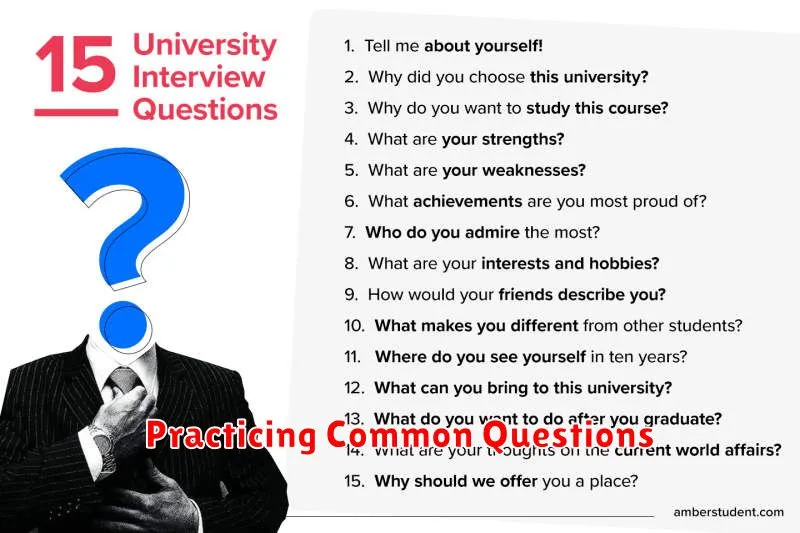Preparing for university interviews can be a daunting task, but with the right preparation, you can increase your chances of success. University interviews are a crucial part of the admissions process for many undergraduate and postgraduate programs. They provide an opportunity for the admissions committee to assess your academic abilities, personal qualities, and overall suitability for the program. Understanding the purpose and format of these interviews is the first step toward presenting yourself effectively and confidently. Whether you’re applying to a highly competitive program or exploring different university options, this guide will provide you with valuable insights and practical tips to help you navigate the interview process with confidence. Learn how to tackle common interview questions, showcase your strengths, and make a lasting impression.
This article offers a comprehensive guide to preparing for university interviews, covering everything from understanding the different interview formats (like MMI interviews and traditional interviews) to crafting thoughtful responses to frequently asked questions. We’ll delve into specific strategies for showcasing your passion for your chosen field of study, highlighting your relevant experiences, and articulating your career aspirations. By following the advice and tips outlined here, you can approach your university interviews with confidence and increase your chances of securing a place in your desired program. This resource is designed to empower you with the knowledge and tools necessary to succeed in this important step of your university application journey.
Understanding the Interview Format
University interviews typically follow one of several formats. Understanding the potential structure can help you prepare effectively. The most common format is the traditional interview, a one-on-one conversation with an admissions officer or faculty member. This format focuses on assessing your personality, fit for the program, and overall suitability for the university.
Another common format is the panel interview. Here, you will meet with multiple interviewers simultaneously. This format can be more intense, requiring you to manage interactions with several people. Panel interviews allow for diverse perspectives on your application.
Some universities utilize group interviews. In this format, you’ll interact with other applicants through discussions or collaborative tasks. Group interviews emphasize communication skills, teamwork, and leadership potential.
Finally, MMI (Multiple Mini Interviews) are becoming increasingly popular. This format involves rotating through a series of short interview stations, each focusing on a different skill or scenario. MMIs assess your ability to think on your feet and respond to various challenges.
Researching the University Thoroughly
Understanding the university you’re applying to is crucial for a successful interview. Research goes beyond simply knowing the programs offered. It demonstrates genuine interest and allows you to formulate insightful questions.
Begin by exploring the university’s website. Pay close attention to the departmental information related to your chosen course. Look at the faculty profiles, research areas, and recent publications. This will allow you to tailor your responses to align with the department’s specific focus.
Consider the university’s values and mission. How does the university present itself? What are its strengths? Reflect on how these aspects resonate with your own academic and career goals.
Researching the curriculum is also essential. Understand the course structure, modules offered, and assessment methods. This allows you to ask specific questions about the program and demonstrate your preparedness.
Practicing Common Questions

Practicing responses to common university interview questions is essential for a successful interview. This allows you to formulate thoughtful answers and present yourself confidently. Focus on questions related to your academic interests, career aspirations, and reasons for choosing the specific university and program.
Consider these example questions:
- “Why are you interested in this particular program?”
- “What are your strengths and weaknesses?”
- “Tell me about a time you faced a challenge and how you overcame it.”
- “Where do you see yourself in five years?”
- “Why did you choose this university?”
Prepare answers that are specific and genuine, reflecting your individual experiences and goals. Avoid generic responses. Practice delivering your answers aloud to refine your delivery and ensure a natural flow.
Dressing for Success

Your appearance is a key factor in making a positive first impression. While comfort is important, prioritize professional attire. This demonstrates respect for the process and shows you take the interview seriously.
Generally, business formal or business casual attire is appropriate. For business formal, consider a suit (pantsuit or skirt suit) in a neutral color such as navy, black, or gray. Pair it with a button-down shirt or blouse and closed-toe shoes. Business casual offers more flexibility; dress pants or a skirt with a collared shirt, blouse, or sweater is acceptable. Avoid overly casual clothing like jeans, t-shirts, and sneakers.
Ensure your clothing is clean, ironed, and fits well. Keep accessories minimal and professional. Pay attention to grooming – neat hair, trimmed nails, and minimal makeup or cologne contribute to a polished look.
Demonstrating Enthusiasm and Curiosity
Enthusiasm and curiosity are key qualities universities look for in prospective students. These traits demonstrate a genuine interest in learning and a willingness to actively engage with the academic environment.
Show your enthusiasm by speaking passionately about your chosen subject. Mention specific aspects of the program that excite you. Did a particular research project catch your eye? Was there a professor whose work inspired you? Sharing these details will make your enthusiasm authentic and convincing.
Cultivate curiosity by asking thoughtful questions. Prepare some questions in advance, but don’t be afraid to ask new ones that arise during the conversation. Asking questions shows intellectual curiosity and a desire to learn beyond the basic curriculum.
Your non-verbal communication also plays a crucial role. Maintain eye contact, sit upright, and engage actively with the interviewer. These behaviors signal your attentiveness and genuine interest in the conversation.
Communicating Clearly and Confidently

Effective communication is crucial for a successful university interview. Clearly articulating your thoughts and conveying your enthusiasm will leave a positive impression on the interviewer.
Practice answering common interview questions beforehand. Focus on structuring your responses logically, providing specific examples to support your points, and maintaining a natural conversational flow. Avoid rambling or giving vague answers. Prepare examples that highlight your skills, experiences, and achievements, connecting them to the program’s requirements.
Confidence plays a significant role in how you present yourself. Maintaining eye contact, using positive body language, and speaking with a clear, steady voice project assurance. Remember to be yourself, be enthusiastic about your chosen field of study, and demonstrate genuine interest in the university.
Following Up After the Interview
Sending a thank-you note after your university interview is a crucial step. It demonstrates your continued interest and allows you to reiterate key points discussed. Ideally, send this email within 24 hours of your interview.
Keep your message concise and professional. Express your gratitude for the interviewer’s time and restate your enthusiasm for the program. You can also briefly mention a specific topic discussed during the interview to personalize the message.
While waiting for an admissions decision, avoid excessive contact. However, if the university provides a timeline for decisions and that timeframe has passed, it’s acceptable to politely inquire about the status of your application.

